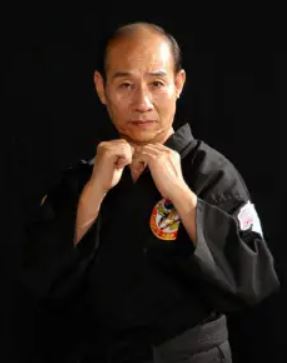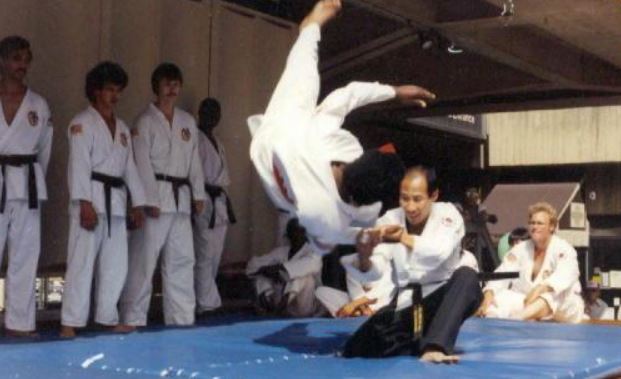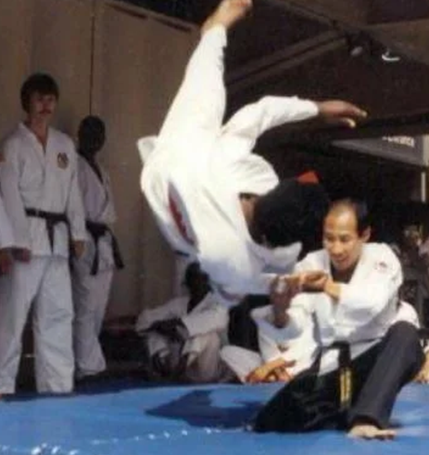
Happy Throwback Tuesday from Choe’s HapKiDo! As we continue to empower lives through martial arts excellence, we’re taking a moment to reflect on our journey. Whether you’re new to our community or a familiar face, welcome! Today, we’re celebrating a milestone – our Grandmaster Choe’s 45th anniversary of teaching HapKiDo in America. Join us as we look back on this incredible legacy and share some highlights from our history.
The Beginning of Grandmaster Choe’s HapKiDo Journey in the U.S.
In February 2023, Choe’s HapKiDo welcomed celebrations of its 45th anniversary of teaching a martial art called HapKiDo in the United States. For our founder Grandmaster JiMong Choe, February 1978 launched his beginnings and legacy of teaching HapKiDo Martial Arts in America.
Born in South Korea, Grandmaster Choe’s father taught him special family techniques passed down from first son to first son for nearly 2,000 years. It is this unique style of HapKiDo that Grandmaster Choe has focused on sharing in the United States. Featured in 1997 in Tae Kwon Do Times, Grandmaster Choe shared that “Martial arts is meant to be studied, practiced and passed down—teaching its history as well as showing its invaluable benefits. If it is not shared with others, martial arts loses a part of its history.” Over the years since the first location opened in 1978, Choe’s HapKiDo has opened schools in Maryland, Virginia, North Carolina, South Carolina, California, New York, and Georgia.
An Interview with One of our Masters!
When interviewed about the celebration of the 45th anniversary of Grandmaster Choe teaching in America, Master Lee Harris shared his feelings and experience in sparring with our Grandmaster:
When I started in 1983, Grandmaster Choe would very often spar with his students. Years later while watching the Matrix movies, there was a scene where Neo was going to meet the Oracle. While on the way, the person escorting him started fighting with him suddenly, then just as suddenly he stopped. When Neo was clearly confused the person said something along the lines of ‘One of the best ways to get to know someone is to fight with them.’ I feel this is so true, and in the years training with Grandmaster Choe, I have learned a lot about him on a level many others are not lucky enough to. As a student, of course I was intimidated to spar with the Master. However in those sparring sessions, I was able to see Grandmaster Choe’s ability, grace, and generosity.

One of the biggest goals Grandmaster Choe has aimed to accomplish for almost five decades was to share the beautiful culture and traditions of South Korea to the American people through teaching HapKiDo. HapKiDo instructors have supported this goal by instilling in all the students the three Purposes of HapKiDo training, which are Self Defense, Health, and Completion of Self Culture.
As Master Harris’s experience in sparring with Grandmaster Choe was eye opening, he could see how much more HapKiDo can offer the world when taught like Grandmaster:
[From sparring with Grandmaster Choe,] I truly learned the breadth of not only his martial arts abilities but also his character. This was further demonstrated when Grandmaster Choe once asked a student what the difference between HapKiDo and sport was. The difference is that sports have rules, whereas HapKiDo has precepts. These precepts are not just for HapKiDo but for your whole life in general. I got to witness over many years how Grandmaster Choe exemplifies the 4 Precepts of HapKiDo with how he teaches, leads his students, and how he conducts himself outside of the HapKiDo School.
In addition to our purposes of training, the 4 Precepts of HapKiDo are the following: We Discipline Our Minds and Bodies; We Develop Good Wisdom and Sagacity; We Cultivate a High Quality of Personality; We Serve the Community. The combination of the Purposes and Precepts of HapKiDo are what our instructors have embodied to pass on to many generations in the United States.
Choe’s HaPkIDO 45TH ANNIVERSARY CELEBRATION FUN
Choe’s HapKiDo honored Grandmaster Choe’s 45th anniversary in teaching HapKiDo Martial Arts in America by the following events: a Championship in Maryland, a huge Black Belt Promotion in March, and our annual Kick-A-Thon fundraiser. Finally, we also offered a special $45 HapKiDo Membership for any new student, uniform included!
Choe’s HapKiDo in the Present
Since 1978, Choe’s HapKiDo schools have helped to cultivate nearly 2,000 Black Belts who are now doctors, lawyers, engineers, mothers, and fathers. Current HapKiDo locations include Maryland, Virginia, and Georgia. In fact, the first location here in Georgia opened in Duluth in 2004, and there are now four locations with plans to expand in the future. Currently, the Georgia locations are in the following cities: Cumming, Duluth, Flowery Branch, Grayson, Jefferson, and Dahlonega. What’s exciting is that we see more locations being opened in the future!
Join our Choe’s HapKiDo community and experience how our Black Belt programs can guide kids, teens, and adults in the amazing classes we offer! Contact us to learn more and schedule your first class.
Find the location closest to you here: https://trykarateclasses.com/karate-locations/schedules/



















